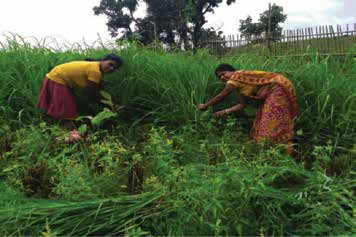Lemongrass Farming as an enterprise
Lemongrass Farming as an enterprise
Background
Deen Dayal Antyodaya Yojana - National Rural Livelihoods Mission (DAY-NRLM) has always given emphasis on the sustainable livelihoods generation and adoption of multiple livelihoods for a household. The way of providing sustainable livelihoods generation is always challenging. In order to provide sustainable livelihoods to the rural women an innovative initiative under DAY-NRLM has been taken up in the form of Lemon grass farming.
The rising health consciousness among the urban population has led to a booming alternative market of medicines and therapies as more and more consumers seek health in natural products. Natural products are known for their health and medicinal properties, and also that these have little or no side effects. Looking at the market potential of such products, Jharkhand State livelihood Promotion society (JSLPS) has been developing various initiatives to exploit the abundant natural resources of the state by enlisting its rural women and in the process provide them with a means of steady source of income.
Aim
The core aim of this initiative is to link rural women with various sources of income in a bid to make them economically and socially empowered. Lemon grass farming has been a successful innovative agricultural practice among the women farmers since it is easy to cultivate and fetches a good price in the market, given its many medicinal and curative properties. Besides, in the context of Jharkhand, where farming is a tough deal in the uplands, lemon grass farming, with little effort on the barren land, is providing good additional income to the SHG women.
Implementation
 For lemongrass farming, JSLPS linked around 500 Sakhi Mandal members with the initiative. Today, each of these women farmers is earning well. In fact, their annual income runs into lakhs, just from the cultivation of lemongrass.
For lemongrass farming, JSLPS linked around 500 Sakhi Mandal members with the initiative. Today, each of these women farmers is earning well. In fact, their annual income runs into lakhs, just from the cultivation of lemongrass.
As lemongrass oil fetches good price in the market, it has been taken up in value chain approach where various distillation units for the Sakhi Mandals have been installed at the Gramin Seva Kendra. Now the oil processing is also being done in-house adding to the earnings of the women farmers involved. Lemongrass cultivation has been taken up in 31 blocks of 16 districts in Jharkhand by more than 16,500 SHG women. The plant is being cultivated in barren lands with technical support by ‘Krishi Vigyaan Kendra’ and Central Institute of Medicinal and Aromatic Plants (CIMAP) Lucknow, which ensures value-addition to the yield and distillation unit was also set up with the assistance of these PIAs.
Master trainers have also been deployed to offer technical support and advice to the farmers. Around 1,150 Vanopaj Mitras have been trained to provide technical support and suggestions to the farmers. Lemongrass oil is sold at Rs. 1500-2000 per litre in the local market. The earnings of the women farmers is up to Rs 80,000 per acre of land in a year. Comparatively, the initial one-time investment is a mere Rs 20,000.
Roopmati Devi of Range village of Gumla does not need an introduction today. She is known as a successful woman farmer in her village and all her fame came from lemongrass cultivation. With the help of training and knowledge provided by JSLPS, Roopmati was able to earn an income of about Rs 1,10,000 this year from lemongrass cultivation. Her investment was a paltry sum of Rs. 13,000. She earned another amount of Rs. 15,000 from lemongrass oil.
Last Modified : 6/26/2023
This topic provides information about drudgery red...
This topic provides information about opportunitie...
This topic provides information about gaining new ...
This topic provides information about A Successful...
